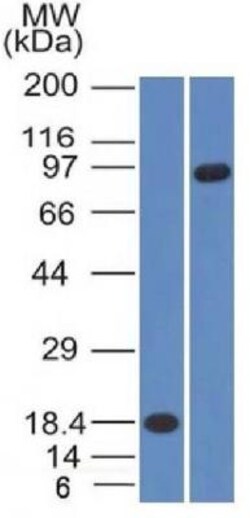Promotional price valid on web orders only. Your contract pricing may differ. Interested in signing up for a dedicated account number?
Learn More
Learn More
Mouse anti-E-Cadherin, Clone: CDH1/1121 + CDH1/1122, Novus Biologicals™


Mouse Monoclonal Antibody
Supplier: Novus Biologicals NBP2447200.2MG
Description
Ensure accurate, reproducible results in Western Blot, Flow Cytometry, Immunohistochemistry (Paraffin), Immunofluorescence
Specifications
| E-Cadherin | |
| Monoclonal | |
| 0.2mg/mL | |
| Western Blot 0.5 - 1.0 ug/ml, Flow Cytometry 0.5 - 1 ug/million cells in 0.1 ml, Immunocytochemistry/Immunofluorescence, Immunohistochemistry-Paraffin 0.5 - 1.0 ug/ml, Immunofluorescence 0.5 - 1.0 ug/ml | |
| P12830 | |
| CDH1 | |
| Recombinant fragment (119 Amino acid residues around aa 400-500) of human E-Cadherin protein | |
| 0.2 mg | |
| Cancer, Cell Cycle and Replication, Cellular Markers, Extracellular Matrix, Plasma Membrane Markers, Signal Transduction | |
| 999 | |
| Human, Mouse | |
| Purified |
| Western Blot, Flow Cytometry, Immunocytochemistry, Immunofluorescence, Immunohistochemistry (Paraffin) | |
| CDH1/1121 + CDH1/1122 | |
| Unconjugated | |
| 10mM PBS and 0.05% BSA with 0.05% Sodium Azide | |
| Arc-1, cadherin 1, E-cadherin (epithelial), cadherin 1, type 1, E-cadherin (epithelial), cadherin-1, calcium-dependent adhesion protein, epithelial, CAM 120/80, CD324, CD324 antigen, CDHE, cell-CAM 120/80, ECAD, E-cadherin, Epithelial cadherin, LCAM, UVOE-Cadherin, uvomorulin | |
| Mouse | |
| Protein A or G purified | |
| RUO | |
| Primary | |
| Recognizes a protein of 120-80kDa, identified as E-cadherin. Cadherins comprise a family of Ca2+-dependent adhesion molecules that function to mediate cell-cell binding critical to the maintenance of tissue structure and morphogenesis. The classical cadherins, E-, N- and P-cadherin, consist of large extracellular domains characterized by a series of five homologous NH2 terminal repeats. The relatively short intracellular domains interact with a variety of cytoplasmic proteins, such as catenin, to regulate cadherin function. E-cadherin plays an important role in epithelial cell adhesion. A decreased expression of E-cadherin is associated with metastatic potential and poor prognosis in breast cancer, prostate and esophageal cancer. In combination with p120 Catenin, it is useful for the differentiation between ductal (E-cadherin +) and lobular (E-cadherin -) breast carcinomas. It may also help in diagnosis of mesothelioma. | |
| Store at 4C. | |
| IgG |
Product Content Correction
Your input is important to us. Please complete this form to provide feedback related to the content on this product.
Product Title
For Research Use Only
Spot an opportunity for improvement?Share a Content Correction
